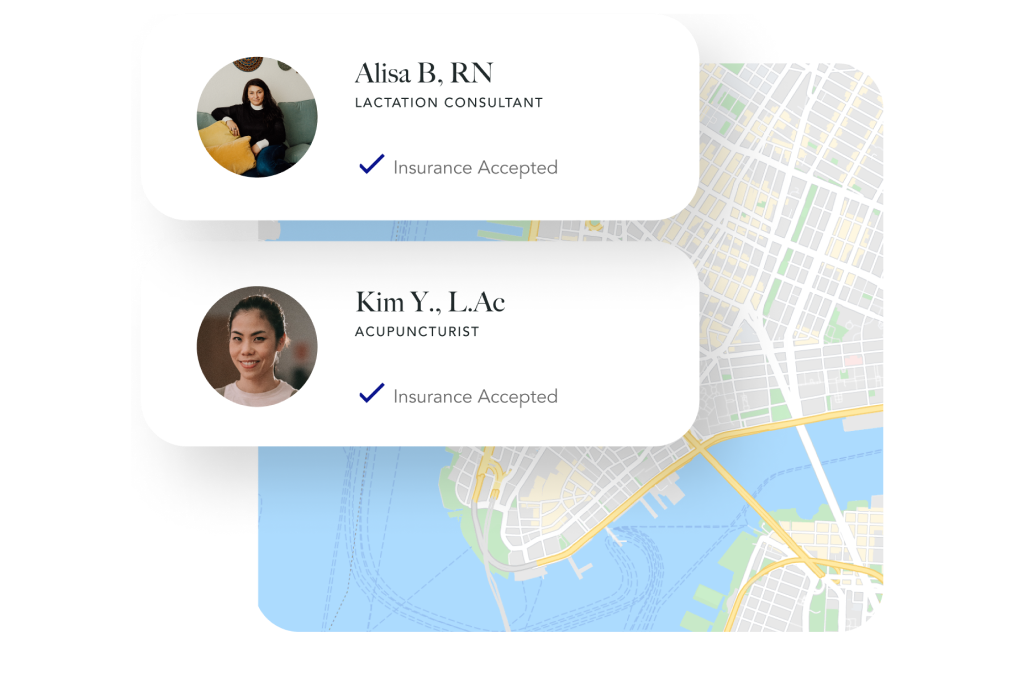
Specialties
Find Allergy Nutritionists Near You
90% of Zaya patients pay $0 for one-on-one nutrition counseling with a registered dietitian.
Find An Allergy Nutritionist Near YouBrowse our directory of allergies nutritionists and book your visit online using your insurance.

Find the right care for you.

Pay with your insurance.

Book your visit online.
Get a provider who gets you.
Our providers are nutrition experts and take the time to get to know you and your needs.
Real talk from real patients.
More about food allergies, intolerances, & our allergies nutritionists
Allergies and intolerances are two distinct reactions that individuals may experience in response to certain foods or substances.
Food allergies involve an immune system response, where the body mistakenly identifies certain food proteins as harmful and triggers an allergic reaction. This reaction can range from mild to severe and may involve symptoms such as hives, swelling, difficulty breathing, or anaphylaxis.
In contrast, food intolerances do not involve the immune system. They occur when the body has difficulty digesting or processing specific components of food, such as lactose or gluten.
What causes food allergies and intolerances?
Food allergies and intolerances can be triggered by various factors, leading to adverse reactions in susceptible individuals. Food allergies occur when the immune system mistakenly identifies certain proteins in food as harmful substances and launches an immune response.
On the other hand, food intolerances are caused by difficulties in digesting or processing specific components of food. Here are the causes of food allergies and intolerances:
Causes of food allergies:
- Genetic predisposition. Certain genetic factors can increase the likelihood of developing food allergies.
- Early exposure. Introducing certain allergenic foods too early in infancy may increase the risk of developing allergies.
- Environmental factors. Environmental allergens such as pollen or pet dander may contribute to the development of food allergies.
- Immunological factors. Abnormal immune responses or dysregulation of immune cells can play a role in the development of food allergies.
Causes of food intolerances:
- Enzyme deficiencies. Lack of specific enzymes needed to digest certain components of food, such as lactase for lactose intolerance.
- Sensitivity to food additives. Some individuals have adverse reactions to food additives like artificial colors, preservatives, or flavor enhancers.
- Chemical sensitivities. Certain chemicals naturally present in food, such as histamine or tyramine, can trigger reactions in sensitive individuals.
- Irritable bowel syndrome (IBS). Individuals with IBS may be more prone to developing food intolerances.
What are the symptoms of allergies and intolerances?
Food allergies and intolerances can cause a range of symptoms, affecting individuals differently. Allergies trigger an immune response, while intolerances stem from difficulties in digesting or processing specific components of food.
- Hives, itching, or eczema.
- Swelling of the lips, face, tongue, or throat.
- Tingling or itching sensation in the mouth.
- Difficulty breathing or wheezing.
- Nasal congestion or runny nose.
- Nausea, vomiting, or abdominal pain.
- Diarrhea or bloody stools.
- Dizziness or lightheadedness.
- Anaphylaxis, a severe and potentially life-threatening allergic reaction characterized by swelling, tightness in the throat, rapid pulse, and loss of consciousness.
Symptoms of food intolerances:
- Nausea, stomach pain, or cramping.
- Bloating or gas.
- Diarrhea or loose stools.
- Vomiting.
- Heartburn or acid reflux.
- Headaches or migraines.
- Irritability or nervousness.
- Skin problems, such as rash or eczema.
- Fatigue or lethargy.
What are the risks of food allergies and intolerances?
Untreated food allergies and intolerances can lead to various risks and complications, impacting both physical and mental health. Here are some of the potential consequences:
Risks and complications of untreated allergies:
- Anaphylaxis. Delayed or inadequate treatment of severe allergic reactions can result in anaphylaxis, a life-threatening condition that requires immediate medical attention.
- Respiratory issues. Persistent exposure to allergens can contribute to chronic respiratory problems, such as asthma, sinusitis, or recurrent bronchitis.
- Skin conditions. Untreated allergies may lead to chronic skin conditions like eczema or hives, causing discomfort and affecting overall quality of life.
- Nutritional deficiencies. Avoiding certain foods due to allergies may result in nutrient deficiencies if suitable alternatives are not included in the diet.
- Impaired growth and development. In children, untreated allergies can interfere with normal growth and development, potentially affecting height, weight, and overall physical well-being.
- Mental health impact. Allergies, particularly those with severe symptoms, can contribute to anxiety, social isolation, and decreased quality of life.
Risks and complications of untreated food intolerances:
- Gastrointestinal issues. Continual consumption of trigger foods can lead to chronic digestive problems, including abdominal pain, bloating, diarrhea, or constipation.
- Malnutrition. Untreated food intolerances may result in nutrient deficiencies, especially if essential food groups are consistently avoided without appropriate substitutions.
- Reduced quality of life. Persistent symptoms from untreated intolerances can significantly impact daily activities, social interactions, and overall well-being.
- Emotional and psychological impact. Chronic gastrointestinal distress and related symptoms can increase stress, anxiety, and mood disturbances.
When to see an allergies nutritionist
When faced with food allergies and intolerances, seeking guidance from an allergy nutritionist can be highly beneficial for both children and adults. These specialists provide personalized nutrition advice and support to individuals dealing with food allergies and intolerances.
Here are some indications of when to consider seeing an allergy nutritionist:
- Newly diagnosed. If you or your child has recently been diagnosed with a food allergy, consulting an allergy nutritionist can help navigate the dietary changes and ensure proper nutrition while avoiding allergenic foods.
- Multiple allergies. Having multiple food allergies can make meal planning and meeting nutritional needs more challenging. An allergy nutritionist can provide guidance on managing a diverse range of allergies and creating a balanced diet.
- Nutritional deficiencies. Allergies, especially when multiple foods are eliminated, can increase the risk of nutrient deficiencies. An allergy nutritionist can assess and address any nutritional gaps, ensuring adequate intake of essential nutrients.
- Growth and development concerns. An allergy nutritionist can monitor growth patterns, assess developmental concerns, and create appropriate meal plans to support healthy growth in children with allergies.
- Complex cases. For individuals with complex medical conditions or comorbidities alongside allergies, an allergy nutritionist can provide specialized dietary guidance, considering specific health considerations.
- Meal planning and recipes. Allergy nutritionists are skilled in creating customized meal plans and recipes that accommodate specific allergies, ensuring a balanced and enjoyable diet.
How Zaya Care’s allergies nutritionists can help
Zaya Care’s allergy nutritionists provide comprehensive support and guidance to individuals managing food allergies and intolerances. These specialists play a crucial role in helping patients navigate their dietary restrictions, ensure proper nutrition, and maintain a healthy lifestyle.
During the first appointment with an allergies nutritionist at Zaya Care, individuals can expect a thorough evaluation of their medical history, allergy diagnosis, and current dietary habits. The nutritionist will work closely with the patient to understand their specific food allergies and intolerances and any accompanying dietary restrictions.
Dietitians provide detailed education on how to read food labels, identify hidden allergens, and avoid unsafe foods. Additionally, the nutritionist will develop a personalized meal plan that meets the individual’s nutritional needs while considering their food allergies and intolerances.
Follow-up appointments with Zaya Care’s allergies nutritionists are essential to ensure ongoing support and monitor progress. These appointments provide an opportunity to address any challenges or concerns that may arise and make necessary adjustments to the meal plan.
Regular check-ins with an allergy nutritionist help individuals stay on track with their dietary management, promote compliance with allergen avoidance, and optimize their overall health and well-being.
Benefits of working with a Zaya Care allergies nutritionist
Working with a Zaya Care allergies nutritionist offers personalized dietary management and education, empowering individuals to effectively manage their food allergies and intolerances.
These specialists develop customized meal plans, providing practical strategies tailored to each person’s unique needs. Zaya Care allergy nutritionists educate individuals on food allergies, label reading, and identifying hidden allergens, empowering them to make safe food choices.




